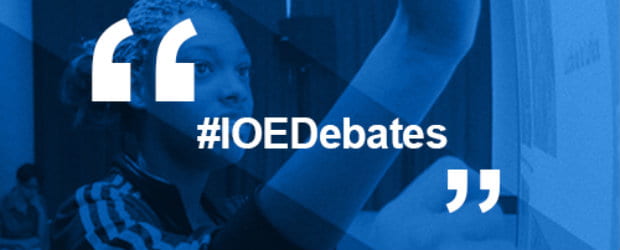Will we have a Beveridge Report for ending the attainment gap?
By Blog Editor, IOE Digital, on 12 May 2021
Just as one can’t out-exercise a bad diet, education policy and the efforts of schools and teachers can’t out-run societal inequalities. But they can serve to exacerbate or alleviate those inequalities.
The socio-economic attainment gap has been a long-standing focal point of education policy and debate, albeit not as long-standing as the attainment gap itself. It’s a gap that seems in some respects inevitable and intractable (and on that point it is sobering to remind ourselves that 14m people in the UK, around a fifth, live in relative poverty; that’s a third of children). It is an aspect of education systems that leaves optimists fatalistic, and new teachers surprised to find themselves defending elements they never thought they would, such as high-stakes exams.
For our debate What if… we really want to close the attainment gap ‘post-Covid’? we were very pleased to welcome teachers Jon Hutchinson and Sammy Wright; Honorary Professor at the University of Manchester, Ruth Lupton; Hetan Shah, Chief Executive of the British Academy; and our chair for the event, Professor Lindsey Macmillan, Director of the IOE’s Centre for Education Policy and Equalising Opportunities (CEPEO). You can read more about our speakers here.
Our panel pointed to various macro-level policies that they felt have ‘baked in’ the effects of inequalities, including marketisation, letting test scores drive the system, over-standardising teachers’ work. At the meso or micro level, the overriding factors of wider differences in means and social and cultural capital re-emerge.
High stakes exams were a case in point. Examples from our panel highlighted that although exams offer the opportunity for more detached or objective marking, in some subjects the exam questions are assessing cultural capital as much as anything else. On the face of it, Records of Assessment offer the opportunity for pupils to present a wider set of skills and talents, but wealthier families will have greater means to help their child develop and demonstrate those skills.
While our panellists collectively put forward a ‘manifesto’ for changes at each of these levels – macro, meso, micro – to ameliorate the attainment gap, all were agreed on the primary importance of alleviating poverty and inequalities via redistribution. Yet, as one of our audience members commented, education and social research has for decades demonstrated that schools cannot compensate for society, making the case for the very same redistribution of resources. The question is why that hasn’t achieved greater traction and why public policy, including in education, has instead seemed to ‘tinker at the edges’ in acting to mitigate the impacts of inequality.
This is down to our national politics and policy. But that in turn is down to citizens and voters. Will Covid change the parameters of the debate about what is deemed acceptable or necessary? Over a year that has been a momentous one in several respects, the nature of public debate has changed: an emphasis on ‘equity’ as opposed to equality, justice as opposed to inclusion, and reparation in place of diversity, is more apparent. But talk is cheap.
One of our panellists looked back to analogous crises in world history and the social change that did or did not follow, at least on our shores. Spanish flu saw little change. While cholera initially led to new public health measures in the 19thcentury, progress waned due to lack of public engagement and support. By contrast, the aftermath of the Second World War was notable for the vote for the welfare state that followed. The conditions are there now for such a transformational level of change; it remains to be seen if, amidst our exhaustion, that impetus maintains its momentum.
Addressing the educational attainment gap is not something that can be left to the education system, it’s down to us all.
Watch/listen to the debate in full here.
 Close
Close




